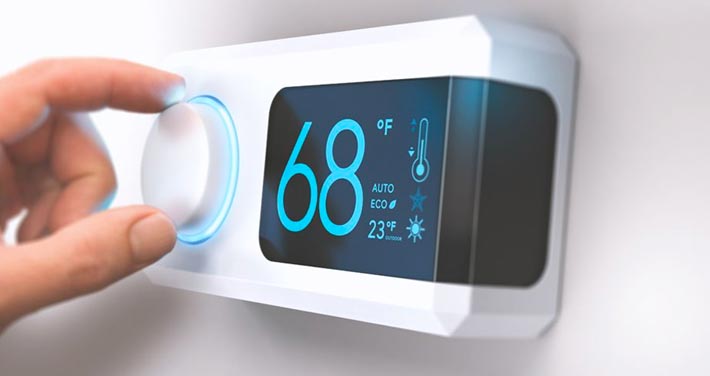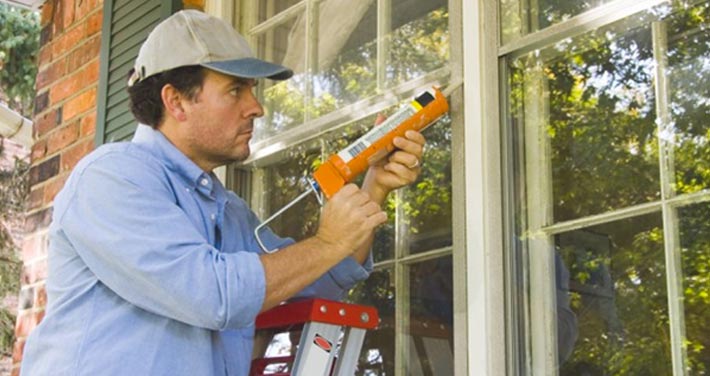Your Weekend Guide to a Warmer Home & Lower Energy Use
That first crisp autumn breeze is a sure sign that Old Man Winter is on his way. Before the cold truly sets in, why not dedicate a weekend to a few simple home improvements? These DIY projects are designed to be quick, affordable, and effective. You’ll not only make your home cozier for the coming months but also see some welcome savings on your energy bills.
Ready to get started? Here are 5 weekend-friendly projects to winter-proof your home.
1. Become a Draft Detective
Time: 2-3 hours
Cost: $15 - $50
Air leaks around windows and doors are one of the biggest sources of energy waste in a home. Chasing down and sealing these drafts is a satisfying project with an immediate payoff in comfort.
- How to Find Leaks: (This step is optional yet informative.) On a breezy day, carefully hold a lit incense stick or a thin piece of tissue paper near the edges of your windows and doors. If the smoke or paper wavers, you’ve found a draft!
- The Weekend Fix:For things that move (doors, window sashes): Apply self-adhesive foam or rubber weatherstripping. It’s easy to cut to size and press into place.
- For things that are stationary (window and door frames): Use acrylic latex caulk to seal any small gaps where the frame meets the wall.
- For windows: If storm windows aren't in the budget, install a heat-shrink window film kit. These inexpensive kits create an insulating layer of air and are surprisingly effective. They're also perfect for renters.
2. Give Your Heating System a Little TLC
Time: 1 hour for DIY tasks, plus a phone call
Cost: $10 - $25 for filters
Your furnace or boiler is the hero of your home in winter, so let's make sure it's ready for action.
- The DIY Tune-Up: If you have a furnace, the single best thing you can do is change the filter. A clogged filter makes your system work harder, using more energy and increasing the risk of a breakdown. Stock up on filters and set a calendar reminder to change them every 30-90 days, depending on the manufacturer's recommendation.
- Call in the Pros: Now is the perfect time to schedule a professional tune-up. An HVAC or boiler technician will clean and inspect your system to ensure it's running safely and at peak efficiency. This ounce of prevention can save you from a costly emergency call on the coldest night of the year.
- Outdoor Prep: Familiarize yourself with the location of your outdoor gas meter. Gently clear away any leaves, branches, or debris, and make a plan to keep it clear of snow and ice all winter to prevent damage and ensure accessibility.
3. Reverse Your Ceiling Fans (Yes, Really!)
Time: 5 minutes per fan
Cost: Free!
This might be the easiest energy-saving trick in the book. Most ceiling fans have a small switch on the motor housing that changes the direction of the blades.
- Summer Mode: Counter-clockwise rotation pushes cool air down.
- Winter Mode: Clockwise rotation at a low speed pulls cool air up and gently pushes the warm air that has risen to the ceiling back down into the living space. You won't feel a breeze, but the room will feel warmer, allowing you to potentially lower your thermostat a degree or two.
4. Insulate the Easy Spots
Time: 1-2 hours
Cost: $20 - $60
While a full attic insulation overhaul may not be a weekend job, there are several smaller insulation projects you can easily tackle in a weekend.
- Seal Outlets and Switches: Did you know that the small gaps around electrical outlets and switch plates on exterior walls can be a sneaky source of drafts? Remove the cover plates and install inexpensive foam gaskets before screwing the plates back on.
- Wrap Your Water Heater: Your water heater works 24/7 to keep water hot. Give it a hand by wrapping it in a pre-cut insulating blanket. This can reduce standby heat loss by 25-45%, saving you money year-round.
- Insulate Hot Water Pipes: Pick up some foam pipe insulation from the hardware store. It’s easy to cut and fit over any accessible hot water pipes in your basement or crawlspace, keeping your water hotter as it travels to your faucet.
5. Get Smart with Your Thermostat
Time: 1 hour
Cost: $50 - $250 (minus rebates!)
If you're still using an old manual thermostat, upgrading to a programmable or smart model is a game-changer.
- The Benefit: According to the U.S. Department of Energy, you can save up to 10% on your heating and cooling costs by simply setting your thermostat back 7-10 degrees for 8 hours a day (like when you're away or asleep).
- The Upgrade: A smart thermostat makes this effortless. It can learn your habits, be controlled from your phone, and optimize your home's temperature for maximum efficiency.
- Check for Deals: Before you buy, be sure to check for rebates! Unitil customers can often find incentives on smart thermostats through their state's energy efficiency website.
- Massachusetts: MassSave.com
- New Hampshire: NHSaves.com
- Maine: EfficiencyMaine.com
Ready for the Next Level?
Once you've tackled these weekend projects, you might be wondering what's next. For even more great weekend project ideas, check out the Department of Energy’s guide to Do-It-Yourself Energy Savers Projects at energy.gov/energysaver/do-it-yourself-energy-savers-projects
Next, look into a home energy assessment to get a detailed evaluation of your home. An expert will provide a detailed report on where your home is losing the most energy and which major upgrades—like attic insulation or new windows—will give you the biggest return on your investment. Check your state's energy efficiency website (NHSaves.com, MassSave.com, or EfficiencyMaine.com) for programs available in your area.
These small weekend projects can really add up, leading to a more comfortable home and noticeable savings.
Key Takeaways
- Tackle the small stuff first. You don't need a huge budget or a professional contractor to make a big impact on your home's comfort and energy bill this winter.
- Stop drafts in their tracks. Sealing air leaks around windows, doors, and outlets is one of the most cost-effective and immediate ways to save energy.
- Don't forget the freebies. Check out your state's energy efficiency website (NHSaves, MassSave, or EfficiencyMaine) for rebates and incentives that will help reduce your energy usage.
- A little maintenance goes a long way. Changing your furnace filter and scheduling a professional tune-up are essential steps to ensure your heating system runs efficiently all season.





